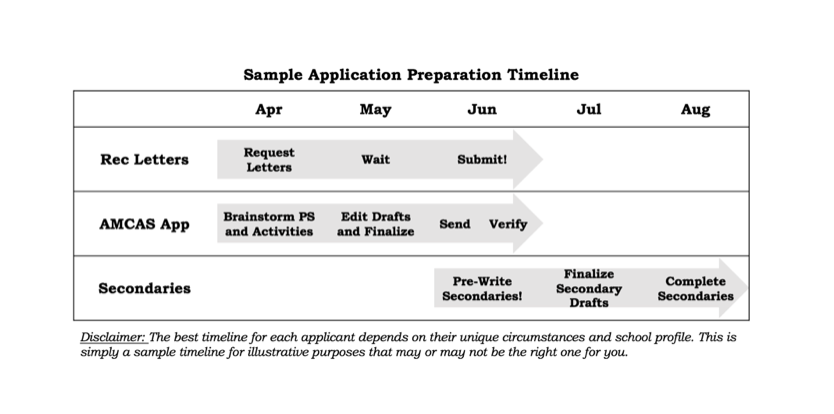Last Updated on June 24, 2022 by Laura Turner
With so many deadlines and moving parts to med school apps, it’s easy to become overwhelmed. In this article, we’ll discuss how to be strategic about when you write what. At the end of this article, we’ll give a sample timeline that you can use. We will focus on the AMCAS app, but a lot of our advice is applicable to other application types as well.
Our motivation for writing this article is that we have too many friends who didn’t get into medical school because they applied late. It’s heartbreaking to find out you didn’t get in because of something so avoidable. We don’t want that to be you.
Before we get into the details of our advice, here are the key dates you should be aware of for the 2018-2019 application cycle:
May 2nd: AMCAS Application Opens
June 1st: AMCAS Submission Opens
June 30th: First Application are sent to Medical Schools
Early July: School-Specific Secondaries are sent to applicants
September: Interview Invites Begin
Many medical schools formally state a preference for early submission on their websites. The University of Michigan, for example, writes on its website: “We strongly encourage all applicants, including MSTP, to apply as early as possible due to our competitive rolling admission process.” Their admissions office suggests you “begin filling out your AMCAS primary application as early as May and then submit it in early June.”
You’ll hear the term “rolling admission” a lot. To highlight how this works, let’s take a purely hypothetical example to show rolling admissions in practice. Let’s say a medical school is offering 200 seats for its incoming class in August 2019. On average, this school receives about 6,000 applications. If the school has a “rolling admission” policy, it may pick its first 100 incoming class for the earliest 2,000 applicants. The next 75 incoming class may come from the next 2,000 applicants. This would leave only 25 seats for the next 2,000 batch of applicants. Even if you are the most outstanding applicant, your chances of earning an acceptance has gotten a lot harder simply because there are fewer seats left! Keep in mind that different schools approach rolling admissions differently, and this doesn’t apply to non-rolling admissions committees who have a completely different system.
As important as submitting early is, we caution against rushing through your apps. It’s important to find a balance between being timely with writing thoughtful material. The last thing you want to do is submit unpolished essays with grammatical errors. In the grand scheme of things, a one or two-week delay won’t make a big difference if you need that time to polish your essays.
Major Causes of Delayed Applications
From our experience with clients, we’ve identified four major causes of delayed applications:
AMCAS Verification: After you submit your AMCAS, there is a processing time during which the AAMC verifies your AMCAS application. According to AMCAS, “After AMCAS has received both your application and all of your required official transcripts, the verification process takes about 6 weeks.” If your app isn’t verified, you’ll have to wait even longer. Many applicants don’t take this into account, causing them to underestimate how much time they need.
The Personal Statement: The personal statement is by far the most important essay you will write in your application. Appropriately, most applicants spend a tremendous amount of time perfecting it, making sure it’s getting the right message across. One common reason for a late personal statement is not having a structured way to begin. We recommend beginning by brainstorming and preparing multiple drafts. Another issue is too many or unreliable editors. Too many editors may dilute your voice and your essay may not represent you well. Unreliable editors can delay your progress because their turnaround time might be too long.
Rec Letters: Often, it’s professors or advisors who delay applications by taking too much time to write letters. We recommend encouraging professors to submit their letters by early June or mid-June. You should remember professors are receiving requests from many other premeds around April or May. We recommend reaching out to them as early as February so they know ahead of time. That way, you have cushion time in case a professor takes too long.
Secondaries: Secondaries are school-specific essays. Some of these secondaries are really long (6+ pages) while others only have one optional prompt. Depending on how many schools you apply to, secondaries can take a long time.
Tips for Managing Your Secondary Essays
Of all these factors, we’ve found that the #1 cause of delayed applications is delayed secondaries. To focus in on this, we’ve listed below a few tips to help you manage secondaries:
- While you’re waiting for your AMCAS to be verified, prewrite your secondaries. The first secondaries come out around early July. Usually, secondaries come in all at once, so if you wait until early July to start, you can get overwhelmed pretty quickly. To mitigate this, we highly encourage that you pre-write your secondaries. The good news is that most schools don’t change their secondary prompts from year to year. You can pre-write your secondaries in June by looking up past prompts. Having this out of the way even before receiving a secondary is huge stress off your shoulders.
- Prioritize your secondaries. If you’re applying to more than 10 schools, it’s impossible to write them all at the same time. Before you start writing, we recommend ranking your secondaries from top-priority to low-priority. Use two factors to rank them:
- How important timing is to the school (ex. which schools begin interviewing earlier or use rolling admissions). You can get this information from MSAR.
- How much interest you have in the school. It makes sense to prioritize the schools you are more interested in.
Putting this all together, we’ll conclude this by sharing a sample application preparation timeline that integrates all the factors we talked about in this article.

